Floodlights is the powerful and inspiring story of Andy Woodward, one of the first footballers to come forward with allegations of sexual abuse in the national game.
Screenwriter (, , ) explains how he adapted the true story into a drama for ±«Óãtv Two.
Watch Floodlights on ±«Óãtv Two and ±«Óãtv iPlayer from Tuesday 17th May at 9pm
Watch the trailer for Floodlights: The impactful and important story of Andy Woodward, the former professional footballer whose brave revelations about the sexual abuse he suffered as a youth player sent shockwaves throughout the industry.
How did you first get involved with Floodlights?
My agent got in touch and two producers from ( and ) came up to see me. They’d already written a document which was pretty extensive on the research side. All the information which hadn’t really come out, beyond the Guardian and the television interviews with Victoria Derbyshire, was in that document.
They came up to Manchester. Their document was so informative that I just thought “this is something that you’ve got to take on”.
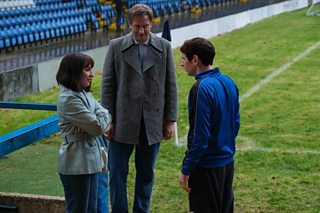
Jean Woodward (MORVEN CHRISTIE);Terry Woodward (STEVE EDGE);Andy Woodward (GERARD KEARNS) in Floodlights (photo credit: Credit: ±«Óãtv/Expectation TV/Matt Squire)
What was your awareness of the story before that?
I’m not on Twitter, but I knew there had been this storm through the press and I just remember feeling that this was a different kind of abuse scandal because it was a professional footballer who had been involved. I read the Guardian and the , but beyond that it was a news story to me like everyone else.
Why did you want to take on this project?
I could see why the producers had seen me originally as a good fit for the project as it was set in the late 80s and 90s in Manchester and about football. I think for me it was because I was personally aware of the world that it was set in. I wasn’t having to go that far in my imagination to understand the football pitches that Andy Woodward had been brought up on as a kid, and those kinds of coaches who were very gregarious and good at football. I’d seen Andy play as well, so those clubs that he was involved in and the area that he came from, and almost the kind of economic class, it was relevant to me. As far as casting the net wide in the mind, it wasn’t that far to cast. Sometimes that’s quite comforting if you’re a writer.
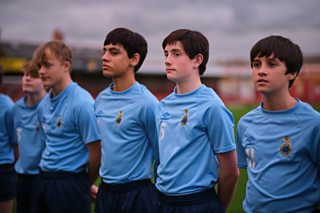
Batzy (LAWTON DICKENS);Ash Stevenson (MOHAMMAD SAKHI);Andy Woodward (MAX FLETCHER);Jobbo (FRANKIE FRIEND) in Floodlights (Photo credit: Credit: ±«Óãtv/Expectation TV/Matt Squire)
Why do you think that drama is the way to tell this story rather than documentary? What does drama bring?
More awareness is the goal. Drama touches more people and people seem to watch it more, it has a more lasting effect. The information that we’re trying to put out needs to keep coming and I think a drama is really apt on this occasion because there are still lessons to be learnt. The more you shine ‘floodlights’ on these situations then hopefully we finally don’t have to write dramas about these subjects.
As far as drama and what it does, I always think that with documentaries you’re on the outside looking through the window at the living room whereas with drama you’re actually in the living room. With good actors you bring things to life in such a different way that I think you can connect to an audience in a more succinct way.
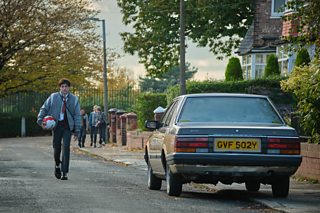
Andy Woodward (MAX FLETCHER) in Floodlights (Photo Credit: ±«Óãtv/Expectation TV/Matt Squire)
Did you carry out your own research beyond that which you were given at the start of the project? Did you speak to the people involved?
I had to really because Andy hadn’t written his book by this time so there was no blueprint or manuscript to refer to, to answer questions. Normally there is a book, which does answer a lot of your primary questions. We didn’t have that, so once I’d structured the drama I had lots of questions which I had to ask Andy directly. That happened over a three day period in Manchester where we sat down and I just had to ask and he had to answer. What I didn’t want to do was just say “well how did it happen?” I wanted those questions to be targeted towards the structure and outline of the script, so that we didn’t go into areas that we didn’t have to, just because of the trauma.
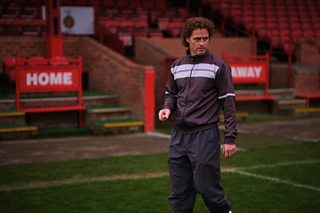
Barry Bennell (JONAS ARMSTRONG) in Floodlights (Photo Credit: ±«Óãtv/Expectation TV/Matt Squire)
How did you devise the structure for telling the story?
Originally the script was in three storylines and three timelines, all three intertwined which really worked on the page. We were always going along the lines of the kid, the footballer and the cop. Almost like three acts in their own right. Originally we’d thought of three episodes in the way that Three Girls was structured, in those act structures. But we then realised that it’s a very difficult topic to come back to, especially if you hadn’t watched the first or second episode then could you enter at the third, probably not. So we then revised it into a single drama, as hopefully people will stay for the 80 or 90 minutes if it’s good enough.
Then we needed to make it contemporary – for me it started out as the contemporary story - in other words the Andy who we saw in the news in 2016. As we went into the edit we realised that the story was totally within football and it made sense to leave the cop strand for a third act standalone and intertwine the two storylines of the kid and the footballer. We all thought that brought you into the drama in a way which emphasised the unique aspect of this story – the football.
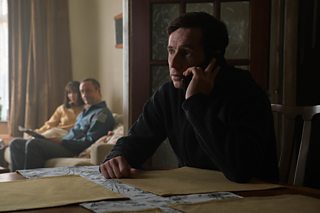
Jean Woodward (MORVEN CHRISTIE);Terry Woodward (STEVE EDGE);Andy Woodward (GERARD KEARNS) in Floodlights (Photo Credit: Credit: ±«Óãtv/Expectation TV/Matt Squire)
How do you manage the risks and responsibilities of telling a true and very sensitive story? Were there gaps you had to fill or invent in any way?
It’s all pretty much invention in the sense that it’s a ‘movie’ not a documentary. It’s all from my head as my interpretation of speaking to the people involved, speaking to Andy and researching everything around it. So I look at it all as invention, but invention based in truth.
As far as the moral responsibility is concerned you do think about that and about the people involved not just in the targeted story that you’re telling but also in the other stories that you can’t tell and how this affects people once it goes out. You have to weigh up the pros and cons and come out on the side of ‘what’s the greater good here?’. At the end I felt that this drama and (without sounding too pompous) the greater good that it could achieve was a lot better than not doing it.
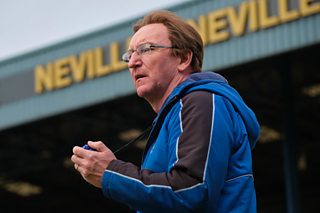
Neil Warnock (ANTONY BYRNE) in Floodlights (Photo Credit: ±«Óãtv/Expectation TV/Matt Squire)
Were there key themes that you really wanted to get across?
Football was obviously the main one and I think that crossed into male angst and mental illness of men and the silence that a lot of men take to their graves in whatever shape or form. That was something that I really wanted to explore. It seemed to me that there were other victims and getting that message out will hopefully help guys. If you see people like Andy speaking, then hopefully the normal guy in the street will feel able to speak too.
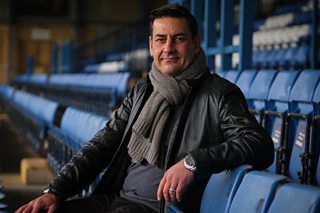
Andy Woodward (Photo Credit: ±«Óãtv/Expectation TV/Matt Squire)
Do you think there was anything particular about that environment which enabled someone like Bennell?
He did it on such a massive scale. He groomed everybody with his skills and his persona and his larger than life character and his humour. I don’t think it’s necessarily toxic masculinity, I just think he was good at what he did – that included the football but sadly also finding ways to carry out abuse.
What can we learn from this story? Why do these things keep happening? What are the takeaways from Floodlights?
I think we are still at risk and I don’t know how you stop these things from happening because people like Bennell are very devious. As the world changes and safeguarding goes up then are they looking elsewhere to do what they do? I just hope that in five or ten years’ time that we’re not still creating dramas like Three Girls or Floodlights. That’s not to take away from them but I just hope that we don’t have to keep telling these stories because that means they’ve continued to happen.
We do have a hopeful ending, I think you’ve got to have that. I hope people go and ask questions about ‘why?’. Times change so quickly but there was a in the 90s about it and it’s mad that wasn’t acted upon then.
The takeaways should be that if anyone feels that this is happening to them that there’s a way to sort it out.
Watch Floodlights on ±«Óãtv Two and ±«Óãtv iPlayer from Tuesday 17th May at 9pm
